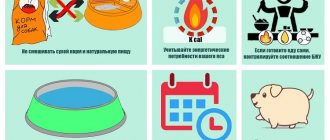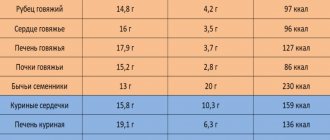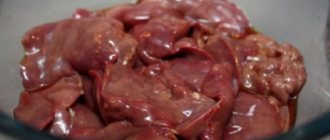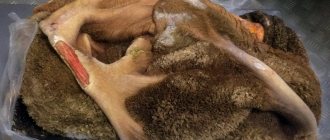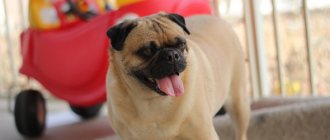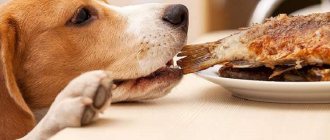The birth of puppies to a dog is an event that radically changes the pet’s life. A nursing dog needs to be looked after carefully. In this case, special attention should be paid to the nutrition of your pet. Therefore, it is necessary to figure out in advance what to feed a nursing dog and how to create the right diet for it.
The birth of puppies is an important event due to which you have to change your dog’s diet.
Feeding features: why is it important
The rules for feeding pets after childbirth and the birth of offspring differ significantly from how ordinary dogs are fed. Changes in the diet are due to the fact that now the dog has to share some of the nutrients from the food with the newborn puppies through milk. Therefore, after giving birth, a dog should eat more food, which contains many vitamins and other vital substances.
A properly formulated diet helps your dog recover after giving birth.
It is necessary to carefully study and reconsider the current approach to pet nutrition. It necessarily excludes all bad foods that can harm the mother of the puppies. It is necessary to create a diet in such a way that it includes the optimal amount of carbohydrates, fats and proteins. Additional Information! When feeding dogs of any breed, you can use all commercial foods. However, only special food for nursing bitches is suitable for dogs after giving birth.
Summarizing
Like all mammals, in dogs there is a very strong connection between the diet of the nursing mother and the well-being of the puppies. Therefore, an owner interested in maintaining the health of his pet and helping her feed and raise healthy puppies should focus on a balanced diet. During this period, there is no need to skimp when choosing food or food for the dog - it should receive all the necessary substances in the right quantities, which cannot be achieved by skimping on good healthy food.
What substances should you get with food?
Depression and loss of appetite are common consequences of childbirth.
Many dog breeders do not know what to feed their dog after childbirth. In the first few days after the puppies are born, you don’t have to think about the bitch’s nutrition.
Most dogs exhibit restless behavior after giving birth. They begin to behave strangely and refuse any food. In such cases, there is no need to worry and try to do something. The dog needs to be given a little time for its body to fully recover and begin to gradually replenish its reserves of useful elements.
Once your pet stops whining and has a good appetite, you can start feeding. The daily food intake will have to be increased. At the same time, you need to give only nutritious and healthy food. It should contain the following substances:
- proteins;
- vitamins C, D, A;
- increased amount of carbohydrates.
How to feed a bitch immediately after the end of the birth process?
Often, dogs that feel the moment of labor approaching refuse food in advance, so as not to create unnecessary heaviness in the intestines and not be distracted from the process. When a dog has already given birth, she is busy taking care of the puppies, and the owner has a logical question: “Does the animal need to be fed now and what should I offer it?”
Instinct forces the new mother to eat the placenta of each puppy, in the usual language - the placenta. In addition to the fact that this is how wild dogs previously “covered their tracks” of childbirth, preventing predators from smelling attractive odors, this way they also refreshed themselves after the grueling and painful process of childbirth. Under no circumstances should a bitch be prohibited from eating the placenta, although there is no danger of attack by predatory animals.
Dogs usually free the puppies from the placenta themselves.
The fact is that the afterbirth contains vitamins, microelements and a large amount of protein that the dog needs to maintain strength and produce milk, rich in substances necessary for puppies. The placenta contains hormones that provoke the production of colostrum, that is, eating it is a kind of signal: “The puppy has been born, you need to feed it!”
Dog's afterbirth
The only thing is that with a large litter (more than ten puppies), eating all the placenta can cause an upset stomach in the bitch. In this situation, you need to offer the animal clean water and also give an adsorbent (for example, activated carbon, one or two tablets for every ten kilograms of weight). However, there is no need to force the dog to drink, or to persuade the dog to eat - it would be correct to offer the first food four to five hours after the birth of the last puppy, when the bitch has calmed down, licked and fed all the children. Below we will tell you exactly what food you can give your dog after giving birth.
Clean, cool water should always be available to the dog.
Stimulation of milk production
Owners of Labradors, Yorkies, Spitz and German Shepherds are often faced with the fact that such dogs do not have enough milk for puppies. To avoid this problem, you need to feed your pet properly.
First postpartum meal
Dairy products are added to the diet in the first week after birth.
It is better not to touch the dog for the first 5-6 hours after the end of childbirth. Only after this can you think about what you can give from food. At first it is better to give liquid food without meat. The next day, porridge and fermented milk products are added to the diet.
First week
Despite the fact that in the first seven days after birth the animals' appetite begins to normalize, they will have to give up meat products. Instead, the following foods are added to the diet:
- cottage cheese;
- kefir;
- milk;
- soups and broths.
Additional Information! In the first week, it is better not to give your dog dry food or other heavy food.
Second week
Many dog breeders are interested in how to increase a dog’s milk supply in the second week, since during this period newborn puppies begin to actively feed. You can add boiled meat to their diet. It should also be given raw in small quantities. Offal, which is offered in small portions, will also be beneficial.
Third and fourth week
Raw meat - added no earlier than the second week.
By the beginning of the third week, the dog can already eat any food. However, despite this, she needs to be given more natural food. It contains many nutritional components that a pet needs after giving birth. The bitch should be fed raw meat, vegetables and dairy products.
Natural nutrition for a nursing dog
It is important to understand that you cannot change an animal’s type of nutrition unexpectedly, especially if we are talking about a dog that has given birth, whose body has already suffered stress. Therefore, if the bitch ate natural products before giving birth, you need to keep this option, making some additions.
It is on a natural diet that it is important to focus on what time period has already passed after childbirth. The basis of the diet will continue to be fresh meat or lean sea fish, poultry, offal, vegetables, lactic acid products, and herbs.
Depending on the week of lactation, nutrition will be adjusted
Table 1. Feeding the dog in different weeks after birth
| How much time has passed? | What to feed? |
| The first week after the birth of puppies | For the first two to three days, the bitch may have no appetite, but every five to seven hours you need to offer the dog food and make sure that she eats at least a little. At this stage, you can give your dog pureed meat and vegetables, kefir, cottage cheese, and lean fish. When the appetite is restored and returns to normal, the bitch is fed in small portions five to six times a day. The dog’s diet certainly includes meat (veal, rabbit, turkey, chicken), offal (liver, lung, brains), fish (low-fat sea fish), and calcined cottage cheese. The first five to seven days after birth, you do not need to offer your dog fruits, herbs and vegetables, so as not to provoke allergies and stomach upset. |
| Second or third week after the birth of puppies | The main feeding remains the same (meat, poultry and offal, sea fish, dairy products). Grated vegetables, berries, fruits (carrots, cauliflower or broccoli, zucchini, apples and pears, pumpkin), chopped greens, and eggs are returned to the animal’s diet. The dog is fed four times a day; if the litter consists of three to four puppies, its pre-pregnancy daily food intake is doubled; if there are more than eight puppies, it is tripled. |
| Fourth to sixth weeks of feeding | At this stage, the puppies are introduced to complementary foods; accordingly, the number of feedings to the mother is reduced to three per day. The nutrition remains the same, only the portion sizes are reduced. When the bitch stops feeding the last puppy, she is given a fasting time. On the first day of weaning, the dog is given a limited amount of liquid and about a quarter of the usual daily food intake. On the second day, the dog receives a third of the usual portion, then half. This will drain her milk. On the fourth day, nutrition returns to pre-pregnancy norms. |
When the puppies begin to receive complementary foods, the mother's portion is reduced
Vitamin supplements for the bitch after giving birth
During pregnancy and lactation, the bitch should receive not only natural products, but also some vitamin and mineral supplements. The fact is that regular food contains the amount of nutrients that an adult animal needs. When a dog is nursing a litter, it requires more resources.
Table 2. Additives to dog food after birth
| Name | brief information |
| "Tsamaks" | The composition includes phosphorus, sulfur, magnesium, potassium, calcium, copper and other substances important for the dog’s body. The drug improves the animal’s immunity and removes toxins. |
| "Tetravit" | Contains vitamins A, E, D3 and F. The drug has an antirachitic effect, promotes the metabolism of calcium and phosphorus in the body, increases the content of vitamins in the blood, regenerates epithelial tissue, and increases resistance to infections. |
| "Gelakan Baby" | A vitamin-protein-mineral cocktail that has a beneficial effect on the formation of the skeleton of puppies, and also protects the joints, ligaments and bones of a nursing dog from calcium leaching. Contains selenium, collagen and vitamins E. |
| "CalciDi" | Contains the necessary amount of calcium and phosphorus necessary for richness of milk. The drug must be administered from the second half of pregnancy so that the skeleton of the fetus is formed correctly and the bitch does not waste her own reserves of nutrients. |
Excel Daily Multivitamin | A complex of vitamins and polyminerals necessary for every animal. The composition includes minerals, calcium, phosphorus, water-soluble and fatty acids, B-group vitamins, linoleic acid. |
Important point! Before introducing the above-mentioned drugs into the diet of a nursing bitch, it is necessary to visit a veterinarian and discuss with him the need for a particular supplement.
A nursing bitch should get vitamins not only from food
Recovery of an animal after feeding and birth
Bearing puppies and subsequent births are accompanied by large energy expenditures. The only way to quickly restore the body after suffering stress is high-quality nutrition. In this case, we are talking not only about good products, but also about vitamin complexes. They contain seaweed, sulfur and fatty acids.
After the end of labor, you need to carefully examine the mammary glands of the bitch. Often small puppies injure them with their mouth or tongue while feeding. Small cracks may appear on them, which hurt and cause discomfort. Damaged areas must be treated with a special paste or ointment.
Important! In the first weeks of recovery, physical activity is contraindicated for the dog.
In the first month after
After the first week, the diet changes somewhat, as the bitch has already physically recovered. New products are being added to the menu and old but favorite ones are returning. It is also important to follow the basic rules:
- The amount of food should increase each week as the puppies grow and require milk. If you do not increase the portions and number of feedings, the body will suffer seriously.
- From the second week you can introduce meat into your diet, but very carefully.
- From the 5th week, complementary foods are introduced to puppies, which means it is necessary to take care of reducing and subsequently canceling lactation so that the babies can quickly switch to nutritious food, and irreparable damage is not caused to the dog’s body.
To stop lactation, the bitch’s diet is sharply reduced by arranging “fasting days.”
It is important to remember that every animal is unique, so nutrition after pregnancy should be selected according to the individual needs of the dog and after consultation with a veterinarian.
Drinking plenty of fluids is a must
While feeding the puppies, the bitch should be given water more often, since abundant and frequent drinking promotes milk production. At the same time, it is not necessary to pour water into your pet every day. You can simply add more rare foods to your diet. For example, you need to regularly feed your dog broths and soups. They not only improve lactation, but also promote digestion and relieve constipation. Thanks to liquid food, the animal will go to the toilet more often.
Don't forget that your dog needs water. You need to feed her with warm liquid, warmed to room temperature. She should drink 2-3 liters of water daily.
Additional Information! You can tell that your dog is not getting enough water based on several signs. Due to lack of fluid, she may stick out her tongue. Sometimes the pet begins to breathe loudly.
What to give at 4-6 weeks
Features of feeding a month after the birth of puppies change both for the babies themselves and for their mother. Puppies can safely be fed with other foods, since now milk alone is not enough for them.
As for your dog, the volume of his diet is reduced. It is also recommended that she be switched to three meals a day during this period. Now the female’s daily diet should contain less wet gruel and puree.
As a rule, a month and a half after the dog has given birth, the babies are taken away from her. When she is left without puppies at all, she needs to have a fasting day. At this time, give her only ¼ of the daily amount of food.
Also limit access to water. After such a diet, the dog is gradually transferred to a normal diet.
The main thing is not to overfeed her, increase the portions gradually.
Should I give dry food?
People who do not know what to feed a husky after giving birth or a nursing chihuahua often immediately give their pets dry food. However, in reality, you should not give such food thoughtlessly. It is necessary to figure out in advance what food can be given.
For lactating animals, complexes containing no more than 25% protein are suitable. Before feeding, open food must be soaked in water. It should not be given in dry form, as this can negatively affect digestion.
Broths and soups are a must-have in your pet’s diet.
Top 5 foods for whelping and lactating bitches
The most optimal food is natural food, but for careful control you need to monitor the diet and think through nutrition. For those who do not have such an opportunity, there are ready-made industrial feeds. Unfortunately, not all of them are well thought out in terms of the ratio of proteins, fats, carbohydrates, vitamins and minerals.
Rating of food for whelping and lactating bitches:
- Acana Puppy&Junior – holistic puppy food. Meat products are used to prepare the food - chicken, chicken entrails, flounder. The food contains no grains, which is also an indicator of quality. There are sources of fatty acids, fiber, vitamins and minerals. The disadvantages include the presence of legumes, which can cause allergies, and the high price (300 rubles).
- Bosch Reproduction – made from high quality raw materials. The advantages include the absence of dyes, flavors and other artificial additives, the presence of vitamins and minerals, and the production of food from natural meat. The disadvantage is the rather high cost (2600 rubles).
- Royal Canin for pregnant and lactating bitches. Well balanced in relation to BJU, contains a vitamin and mineral complex. Among the minuses, it is worth noting the presence of preservatives, which allow the food to be preserved for a long time, and the high price in relation to other food of the same quality (more than 1000 rubles).
- Puppy Healthy Development – food for puppies, suitable for pregnant and lactating dogs. Complete absence of preservatives and additives; the composition contains animal and fish oils, useful for bitches during lactation. Disadvantages - the use of flour from ground bones, meat and skin. The composition contains corn, which itself is an allergenic component.
- Pro Plan - contains mineral supplements, is widely distributed and has a large line of food for nursing dogs of various breeds. Among the disadvantages is the presence of flavoring and aromatic additives; not meat, but offal is used in production.
Diet for eclampsia
Pugs and Jack Russell Terriers often develop eclampsia after giving birth. This disease occurs due to a lack of calcium in the body. The main symptoms of the disease include:
- increased body temperature;
- shortness of breath and increased heart rate;
- deterioration of coordination and loss of balance;
- weakness, due to which the dog may be unconscious;
- loss of appetite;
- dilated pupils;
- convulsions.
Important! If the above symptoms appear, you need to call a veterinarian to come and examine the dog.
During treatment of eclampsia, it is better to exclude solid foods from the diet. Instead, the pet is given more broths and soups.
Volume of one serving
The amount of food eaten by a small dog is selected strictly individually, depending on the needs of the dog’s body. It is considered unacceptable to overfeed a dog, which leads to obesity and problems with the gastrointestinal tract, lungs and heart, and underfeeding, which can cause dystrophy and disorder of the nervous system.
If you watch your Chihuahua or Toy Terrier carefully, you will notice that the small dog's sides become slightly enlarged after eating. Keep an eye on this indicator. Normally, a dog’s sides should neither stick out much nor be sunken.
Consequences of poor nutrition
Weakness is one of the main symptoms of eclampsia.
Some dog breeders believe that poor nutrition cannot harm the dog. However, it is an illiterate diet that is the main cause of eclampsia. In this case, the disease may not appear immediately, but after a month.
Another common problem that occurs due to poor nutrition is indigestion. Most often, dogs have difficulty digesting food if they are fed only dairy products. To normalize digestion, you need to add more rice porridge to your diet. You should also consult your doctor. He may prescribe probiotics or sorbents.
Poor nutrition of the mother can also negatively affect the health of newborn dogs. Their immunity is weakened, which in the future can cause the development of various diseases. Often, due to a weakened immune system, skin and infectious diseases begin to appear.
General data on the nutrition of a dog that has given birth
Typically, the lactation period in dogs lasts about five to six weeks, and the functioning of the mammary glands increases already a couple of weeks before birth. Veterinarians have been studying the bodies of lactating dogs of different breeds for many years to determine whether such a diet is suitable for bitches at different stages of feeding their offspring.
Dogs cannot produce or store most nutrients, vitamins and minerals in their bodies unless the animal receives them through food. Accordingly, these necessary substances will not be in the milk; more precisely, the puppies will first “suck” them out of the mother’s body. If the diet is poor or improper, the bitch will suffer first; after a short time, the negative consequences will affect the entire litter. To prevent this from happening, the owner must understand the basic principles of feeding the dog during the puppy feeding period.
Properly fed bitches grow strong and healthy puppies.
Postpartum toxicosis
There are cases when representatives of miniature breeds exhibit postpartum toxicosis. It is accompanied by convulsions, fear of light, fever and shortness of breath. You should not self-medicate; it is better to immediately seek help from a veterinarian. He will examine your pet and prescribe effective treatment.
A nursing dog needs careful care. In this case, special attention should be paid to the diet. Every dog breeder should know what to feed a postpartum dog and what foods it is better to avoid.
Increased milk supply
Dogs, like people, often lose milk after giving birth. Experts recommend reviewing the diet of a nursing dog and starting to give it food that helps return milk.
In addition, experienced dog breeders advise giving your dog:
- Cow's milk,
- Goat milk,
- Porridge,
- Broths,
- Walnut,
- Milk with honey.
Moreover, many veterinarians recommend giving your dog milk with honey due to the fact that this mixture has excellent milk-producing properties.
In addition, veterinarians recommend the excellent drug “Apilak”. It consists of pressed bee pollen.
If you are using this drug and your dog is not allergic, you need to provide it with water, as the drug is very drying.
Does a four-legged mother need any special food?
The answer to this question is directly related to what the dog ate before giving birth. If it was high-quality food, with a high level of animal protein, it is better to stay on it: a nursing mother does not need unnecessary stress. If the dog’s nutrition was previously inadequate, it is worth switching it to biologically appropriate food as soon as possible.
It is best to choose one of the diets marked Puppy and subsequently use it as the first complementary food for older babies. We recommend:
- Orijen Dog food designed for puppies – Puppy and Puppy Large Breed;
- all products for puppies and juniors from the Acana Heritage line;
- Acana Regionals Dog universal high protein diets.
Peculiarities of childbirth in dogs
If your pupil gives birth for the first time, then you should know that this process in animals occurs on an empty stomach. Body temperature decreases the day before labor begins. Metabolism and food digestion also slow down to save energy. It is easier for the first puppy, who is usually the largest, to pass through the birth canal when the mother's intestines are empty. If her stomach is full, then pushing will be much harder. Contractions may trigger vomiting.
The owner must provide the woman in labor with something to drink: broth, low-fat milk, whey - in a word, whatever the dog usually likes. During the birth process, the bitch expels the placenta after giving birth. She instinctively eats them. The birth is complete if within two hours the pet no longer experiences any pushing or contractions and all the placenta has passed away.
Feeding immediately after birth
Sometimes a dog's instinctive eating of afterbirth can result in diarrhea. To prevent it, it is recommended to prepare rice porridge in advance. It can be stored in the refrigerator for two days.
To prepare it, rinse the rice, place it in a tightly sealed container, pour boiling water over it and add a pinch of salt. Wrap the container in a towel and let the rice stand for 6-8 hours. Then puree the steamed cereal with a blender. It is better to give this porridge to a dog with diarrhea in its pure form. But before giving it to your pet, you can dilute it with hot vegetable broth.
If a new mother has diarrhea for several days, then she will only have to be fed this kind of porridge. Monitor the dog's condition, do not leave it alone for a long time. You should not separate the mother from her offspring to go to the veterinarian. If necessary, it is better to call a doctor at home.
Meat in a dog's diet
Meat is a staple in a dog's diet, but still requires great care. You should avoid fatty varieties like pork and lamb.
Of the lean or dietary varieties, chicken is given if the dog does not have allergic reactions to it. Beef and turkey, along with rabbit and horse meat, are the safest types.
You should not neglect by-products, which contain a huge amount of minerals and vitamins. This includes the liver, heart or lungs.
Raw meat is rich in nutrients, but there is a high chance of contracting infectious diseases. It is recommended to freeze the product in the refrigerator for several days at a temperature of -18C, this way most of the bacteria will die and then lightly boil it.
Causes of lactation problems
According to veterinary experts, the following reasons can cause agalactia or insufficient production of milk secretion in an animal:
- The animal has given birth for the first time
. Lack of milk in a primiparous female is a fairly common phenomenon associated with the slow production of hormones that stimulate milk production. The stress that dogs experience when encountering unusual sensations in their bodies for the first time also delays the normal production of secretions by the mammary glands. - Complicated labor
. Difficult labor, significant blood loss, and the use of antispasmodics are factors that provoke agalactia and insufficient milk production. The cause of impaired secretion may be a caesarean section performed on the animal. - The reason for the lack of milk in a new mother is often diseases of the genital organs
(endometritis, vaginitis, inflammation or ovarian cyst, etc.). Under the influence of inflammatory and hormonal factors in the dog’s body, the processes of milk production and separation are disrupted. - Disturbances in the feeding system of a pregnant female.
Inadequate diet, low quality feed, lack of vitamin A, E, and ascorbic acid in the diet negatively affect milk production in the female who has given birth. - Unsatisfactory living conditions for the animal
. The lactation process can slow down significantly if the dog is kept in a cold, damp, unheated room.
Veterinary experts note that agalactia or insufficient milk production is often caused by certain medications used to treat a dog during pregnancy.


